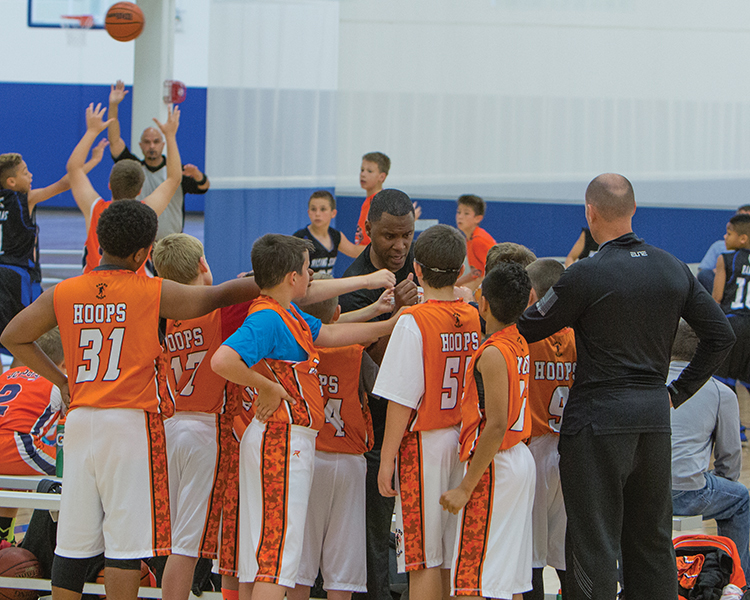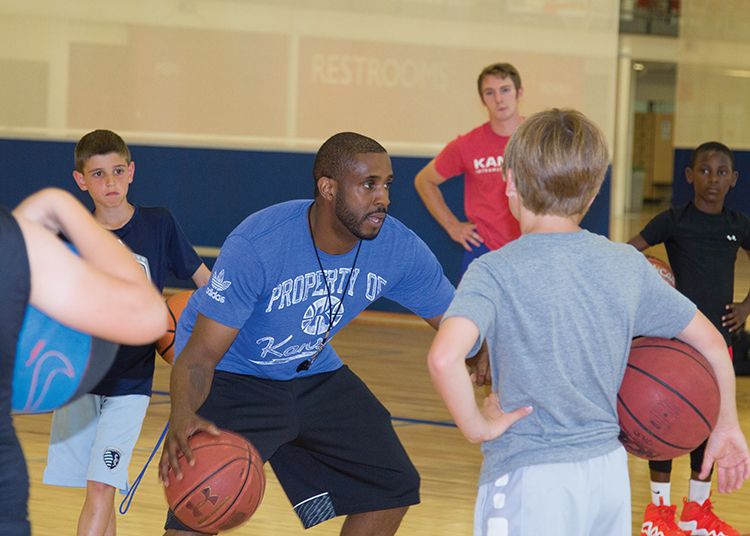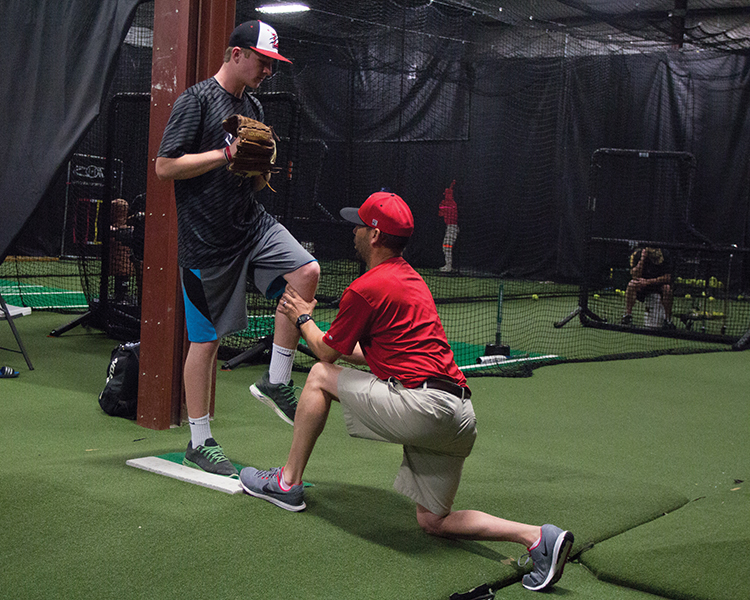| 2015 Q2 | story by BOB LUDER | photos by STEVEN HERTZOG |

Kan Do Hoops
KAN Do Hoops is a basketball academy in Lawrence where young boys and girls go to learn the X’s and O’s of the sport. Scores of aspiring athletes are taught the fundamentals – dribbling, passing and shooting. On a recent rainy spring evening at Lawrence High School’s West Gym, about 30 boys in fifth through seventh grades were shown in repetitious detail the finer arts of moving away from the ball, setting proper screens and running around those screens.
All that replication of the basics, the blowing of whistles, breaking down the game’s smallest details is when KAN Do Hoops Owner, President and Head Coach Nick Marshall is fully in his element. He’s a basketball coach, a teacher of the game.
Yet, those aren’t the moments of practice Marshall covets most. Even more important are the group-huddle sessions, typically held at the beginning, middle and end of practice. While that’s when Marshall perhaps most resembles a teacher leading class, he does NOT talk about basketball, at least not directly. These are the moments Marshall feels he is fulfilling the true mission of KAN Do Hoops – to mold upstanding young men and women who one day will make significant contributions to the community.
At the beginning of this particular practice, Marshall started by asking his players if they were working hard, not only on the court during practice, but in school. One youngster blurted out that he was making A’s in all his classes. Marshall led the entire huddle in an enthusiastic round of applause.
“We have as our motto – play hard, play smart, play together, have fun,” Marshall says. “We’re not big on wins and losses. We stress education, education, education. We want to mold good, strong young people who do well in school and are good citizens. “Not everyone is going to make it to the big leagues.”
Don’t believe Marshall? Then just ask Lee Ice, Youth Sports Supervisor with the City of Lawrence Parks and Recreation Department, who is quick to produce a sheet of paper sent to him from a colleague and culled from a recent sports journal. It looks at six sports: men’s basketball, women’s basketball, football, baseball, men’s ice hockey and men’s soccer and, among other things, shows the percentage of high school and college athletes who make it to a professional league. Among high school athletes, 0.03 percent of men’s and women’s basketball players make it to the pros. Football is 0.08 percent. Really want to make it to the top levels of your sport? Become a baseball player; 0.50 percent of high school players make it.
Ice, who’s been at his current job for 26 years, typically has his hands full scheduling and administrating hundreds of games, teams, tournaments, camps and clinics for sports ranging from basketball, baseball, softball, volleyball and indoor soccer. Much of that activity has brought a huge surge to the Lawrence economy, filling hotels, restaurants and other businesses.
For instance, with volleyball alone, there were 11 weekends through the first five months of 2015 where tournaments filled the Sports Pavilion, each with anywhere from 60-94 teams. Some of those tournaments have brought about bookings of up to 200 hotel rooms in town, and many local businesses have reported business has doubled during these weekends. In fact, Ice has had to send some teams visiting for tournaments to hotels in Topeka and Kansas City because all local hotels have been filled.

Jeff Hawkins coaching his youth basketball players.
Ice says it’s impossible to handle teaching every kid in his programs life and leadership skills. Instead, he teaches his coaches during periodic meetings and clinics what’s truly important to the kids.
“Teaching athletic skills is the easy part,” Ice says. “The harder part is, what’s a kid going to use later on in life? What are they going to use 10 years from now?”
That’s why Ice says, in his countless meetings with coaches, he always emphasizes keeping everything in perspective. It’s not about winning and losing, but more on teaching values such as respect, being on time and teamwork.
“What coaches should be proudest of,” Ice says, “is when a kid comes back years later and is a doctor or lawyer or successful in whatever field they’ve chosen. Kids I used to coach are now coaching for me. To see them pass on things I taught them is very gratifying.”
Kathy Allen, Club Director of the Lawrence Juniors Volleyball Club, couldn’t agree more with Ice’s last statement. While she says LJVBC is a sports club and doesn’t offer any specific classes on leadership skills, she hopes her girls – 10 teams ranging in age from 11-under to 18-under – pick up those skills by playing volleyball.
“I’ve been in this business 25 years,” Allen says. “We’re in our second generation and have kids who have played here now coaching in our program. That’s a great source of pride for me.”
When parents approach Ice with interest about their children one day earning college scholarships, he says typically he encourages another avenue.
“If you want your kid to get an education paid for, then go to the library,” he says. “There’s a lot more (scholarship) money there than in athletics.”
One (athletics) can lead to the other (academics), however, according to numerous studies done on the subject. A recent study completed by a couple of women at the University of Kansas analyzed high-school testing, graduation and attendance data and found that the state’s student-athletes go to school more often and have higher graduation rates (98 percent to 90 percent) than non-athletes. A study done by Dr. Roger Whitley in collaboration with the North Carolina High School Athletic Association showed that the average grade-point mean average of student-athletes was 2.86 compared to only 1.96 for non-athletes, while attendance, discipline referrals and dropout rates also favored athletes.
A couple of local coaches who did pay for their education through playing basketball are pushing the same values as Ice.
With his Kansas United program, Jeff Hawkins, who played guard for the Kansas Jayhawks from 2001-06, “hangs his hat,” as he puts it, on his young athletes performing community service. When joining the program, each student-athlete is presented with a list of expectations. At the top of that list is a requirement that each perform at least one community service project per season. Other expectations include attending all games, practices and meetings on time, respecting authority and maintaining control and good physical condition.

Owner Matt Duncan giving pitching instruction.
“Our biggest thing is giving back to less fortunate,” Hawkins says, whose mother was a long-time educator in Kansas City, Kan. “We want to teach kids to take care of things they can control, like attitude and effort. We want to teach them skills they can use for life after sports. We sneak in that message through basketball.”
One of Hawkins’ teammates at KU was former All-America forward Wayne Simien. Simien serves as Campus Director at KU for a ministry with the moniker Called to Greatness. Simien discovered a faith in Jesus while a student-athlete at KU, and today he not only passes along his skills and knowledge to young people through a series of basketball camps sponsored by the ministry, but also shares that faith and what it has meant in his life after sports.
Matt Duncan, Director of Operations at Next Level Baseball Academy, which has 400 boys ages 8-18 in Lawrence, Topeka and Kansas City, believes his sport is perfectly suited for life and leadership skill-building. The slower pace of the game allows for more time for such interaction, he says.
“The cool thing about baseball is that players really spend more time together,” he says. “There’s a social aspect. Quiet kids get on the field and get comfortable. I’ve seen kids blossom socially on a baseball field.”
Because baseball is not a full-scholarship sport at most colleges, academics are always stressed in his program, Duncan adds.
“I make a promise to parents that, at the end of the day, your kid is going to be a better player and a better person,” he says.
Duncan’s Next Level Baseball is headquartered at Team Performance, an indoor baseball/softball training facility in south Lawrence that, not yet one year into its existence, already serves 1,300 youngsters looking to improve their batting and pitching skills, as well as strength and conditioning.
“We want to be clear that Team Performance is not just a building,” says Aaron Clopton, managing partner. “Our core is programming, and that programming revolves around maximizing total performance. We take a holistic approach. We want to raise standards, but spread it around to a lot of various areas.”
One of the areas Clopton says Team Performance focuses on is leadership. Every youngster who comes into Team Performance has an opportunity to join a leadership group which meets monthly and learns, among other things, how to present, communicate and raise funds.
“Our whole business model is on delayed gratification,” Clopton says. “Putting in time when no one else is. That there’s an investment in waiting until the end for the payoff.”

2 Comments
wow, awesome article.Really thank you! Cool.
Hey! Do you know if they make any plugins to safeguard against hackers?I’m kinda paranoid about losing everything I’ve worked hard on.Any tips?